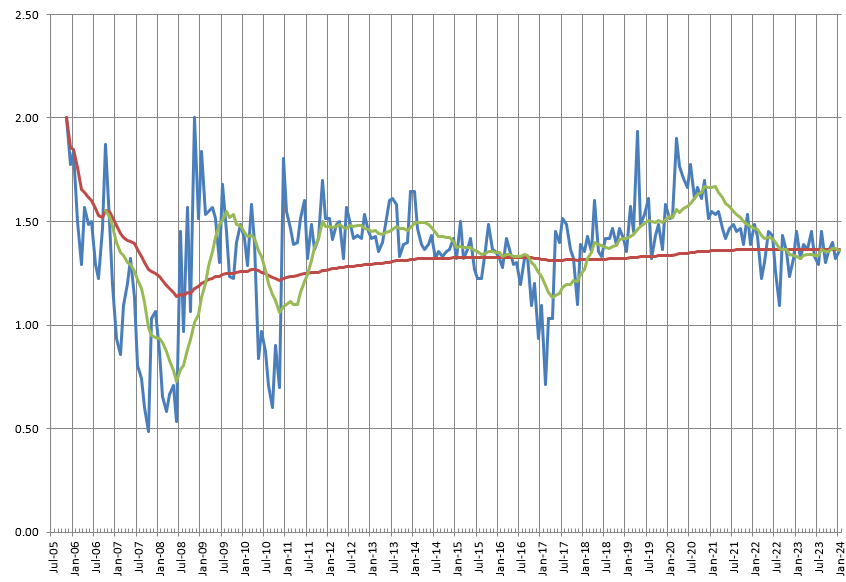A small collection:
Finally, in her column on December 31st, Jennifer Rubin suggested people get some perspective on history to understand that the past was much worse than today.
Update: A friend sent this security-cam photo of the first Yellow Line pulling into the Dempster station after service resumed:

Facing a criminal trial for corruption that he will probably lose, National Rifle Association CEO Wayne LaPierre resigned earlier today:
Mr. LaPierre, 74, has led the organization for more than three decades. But his resignation came as he faced his gravest challenge yet, a corruption trial in Manhattan amid a legal showdown with New York’s attorney general, Letitia James. Jury selection has already begun and opening arguments were scheduled for early next week.
The announcement took place during a board meeting in Irving, Texas. The N.R.A. said Mr. LaPierre had “cited health reasons” as being behind his decision.
The development will change the shape of the Manhattan trial, since Ms. James was seeking to oust Mr. LaPierre from his position. She is also seeking financial penalties from Mr. LaPierre and three other defendants.
Mr. LaPierre played a leading role in transforming gun culture in America, but the last half decade of his tenure at the N.R.A. was marred by scandals and internal upheaval.
"Transforming gun culture" is a polite way of saying that LaPierre advocates giving every first-grader an Uzi. Instead of just leading a trade organization of firearms manufacturers, he claimed that the NRA was on a holy quest to interpret the US Constitution's second amendment—but only its second clause, not the first—instead of trying to enrich his member corporations.
That LaPierre succeeded in both is easy to see in both US gun-murder statistics during his tenure (almost doubled since 1999) and manufacturer sales (more than doubled since 1999). PBS has some helpful charts (from 2022) explaining how we made so many gun manufacturers rich at the cost of a few dozen hundred thousand children.
LaPierre is evil. I hope a jury sees at least enough of that to convict him of stealing from the NRA. But we can all imagine a more poetic end to the person who has done so much to hurt so many.
It was a busy day, so I didn't have a lot of time to write a substantial post. I did want to highlight Nate Cohn's comparison of President Biden's situation going into the 2024 election and another guy who did a pretty good job in his first term:
Harry Truman was the only president besides Joe Biden to oversee an economy with inflation over 7 percent while unemployment stayed under 4 percent and G.D.P. growth kept climbing. Voters weren’t overjoyed then, either. Instead, they saw Mr. Truman as incompetent, feared another depression and doubted their economic future, even though they were at the dawn of postwar economic prosperity.
The source of postwar inflation was fundamentally similar to post-pandemic inflation. The end of wartime rationing unleashed years of pent-up consumer demand in an economy that hadn’t fully transitioned back to producing butter instead of guns. A year after the war, wartime price controls ended and inflation skyrocketed. A great housing crisis gripped the nation’s cities as millions of troops returned from overseas after 15 years of limited housing construction. Labor unrest roiled the nation and exacerbated production shortages. The most severe inflation of the last 100 years wasn’t in the 1970s, but in 1947, reaching around 20 percent.
n the end, Mr. Truman won in perhaps the most celebrated comeback in American electoral history, including the iconic “Dewey Defeats Truman” headline and photograph. He had barnstormed the country with an economically populist campaign that argued Democrats were on the side of working people while reminding voters of the Great Depression. You might well remember from your U.S. history classes that he blamed the famous “Do Nothing Congress” for not enacting his agenda.
I'm glad Cohn got there with data, because I'd already gotten there with inference. This will be a long 11 months, but I think we might just pull this one out.
Paul Krugman succinctly puts to bed any obfuscation of Southern aggression:
But it may be worth delving a bit deeper into the background here. Why did slavery exist in the first place? Why was it confined to only part of the United States? And why were slaveholders willing to start a war to defend the institution, even though abolitionism was still a fairly small movement and they faced no imminent risk of losing their chattels?
Let me start with an assertion that may be controversial: The American system of chattel slavery wasn’t motivated primarily by racism, but by greed. Slaveholders were racists, and they used racism both to justify their behavior and to make the enslavement of millions more sustainable, but it was the money and the inhumane greed that drove the racist system.
Labor was scarce in pre-Civil War America, so free workers earned high wages by European standards.
Landowners, of course, didn’t want to pay high wages. In the early days of colonial settlement, many Europeans came as indentured servants — in effect, temporary serfs. But landowners quickly turned to African slaves, who offered two advantages to their exploiters: Because they looked different from white settlers, they found it hard to escape, and they received less sympathy from poor whites who might otherwise have realized that they had many interests in common. Of course, white southerners also saw slaves as property, not people, and so the value of slaves factored into the balance sheet of this greed-driven system.
Anyone who believes or pretends to believe that the Civil War was about states’ rights should read Ulysses S. Grant’s memoirs, which point out that the truth was almost the opposite. In his conclusion, Grant noted that maintaining slavery was difficult when much of the nation consisted of free states, so the slave states in effect demanded control over free-state policies. “Northern marshals became slave-catchers, and Northern courts had to contribute to the support and protection of the institution,” he wrote.
And the war happened because the increasingly empowered people of the North, as Grant wrote, “were not willing to play the role of police for the South” in protecting slavery.
So yes, the Civil War was about slavery — an institution that existed solely to enrich some men by depriving others of their freedom. And there’s no excuse for anyone who pretends that there was anything noble or even defensible about the South’s cause: The Civil War was fought to defend an utterly vile institution.
Historians have known this for 160 years, but the Southern landowning class has successfully confused the issue for generations, as far as most people understand it. It's always money. Just like the Republican Party's craziness today.
Though my "to-be-read" bookshelf has over 100 volumes on it, at least two of which I've meant to read since the 1980s, the first book I started in 2024 turned out to be Cory Doctorow's The Lost Cause, which I bought because of the author's post on John Scalzi's blog back in November.
That is not what I'm reading today at lunch, though. No, I'm reading a selection of things the mainstream media published in the last day:
Finally, for $1.7 million you can live inside a literal brick oven. The fifth-floor penthouse in the former Uneeda Biscuit building on Chicago's Near West Side includes several rooms with brick ceilings that were, decades ago, the ovens that cooked the biscuits. Cool. (Or, you know, hot.)
Wouldn't that be nice? Alas, people keep making them:
Speaking of excoriation, David Mamet has a new memoir about his 40 years in the LA film industry, Everywhere an Oink Oink. (Expect to find that on next year's media roundup.) And I still have to read Linda Obst's Hello, He Lied, which I keep forgetting to liberate from my dad's bookshelf.
Some Daily Parker followers expressed interest in what books I read this year. So instead of just counting them in the annual statistical roundup, I've decided to list most of the media that I consumed last year in a separate post.
Books
In 2023 I started 39 and finished 37 books, not including the 6 reference books that I consulted at various points. It turns out, I read a lot more than in 2022 (27 started, 24 finished), and in fact more than in any year since 2010, when I read 51.
Notable books I finished in 2023 include:
- Isaac Asimov, Foundation (1951) and Foundation and Empire (1952), neither of which has aged that well. I can forgive Asimov for not knowing how computers would work in the future, but I had a lot of trouble with the rampant sexism.
- Radley Balko, Rise of the Warrior Cop (2013). I admire Balko's police reporting, and I found his explanation of the militarization of local American police forces compelling. Things haven't gotten better since he wrote the book, alas.
- Iain Banks, the first 3 novels of The Culture series (1987–1990). I loved them and have books 4 and 5 already lined up.
- Nicholas Dagen Bloom, The Great American Transit Disaster (2023). Bloomberg's CityLab newsletter recommended this. I recommend it, but as someone who loves urban planning and transit policy, I found it depressing.
- Ray Bradbury, Something Wicked This Way Comes (1962). I meant to read this book ages ago and finally got to it last winter. Loved it.
- Christopher Buehlman, The Blacktongue Thief (2021). Buehlman's alter-ego is Christophe the Insultor, whose show I've caught at the Bristol Faire many times before 2020. I zipped through this novel in a few days, and was just now pleased to find he wrote a sequel, due out in June.
- James S.A. Corey, The Expanse series, books 6-9 (2016–2021) plus Memory's Legion (2022). I started the series in late 2022 and finished it in March. I think The Expanse might be the best hard sci-fi of the decade.
- James Fell, Shit Went Down: Number 2 (2022). A daily history lesson with lots of swearing and a deep hatred of Nazis. I read it a few pages at a time throughout the year.
- S.E. Hinton, The Outsiders (1967). A friend's favorite book from childhood and a classic that I just never got around to reading. Stay golden, Ponyboy.
- Hugh Howey, the Silo series (2011–2013). Fun sci-fi that I wanted to read after watching the Apple TV series. Knocked it off in 3 weeks over the summer.
- Peter Kramer, Death of the Great Man (2023). Recommended by James Fallows. Absolutely hilarious satire of what might happen were a certain corpulent, quasi-fascist US President to die in mysterious circumstances in his psychiatrist's office.
- Steven Levitzky and Daniel Ziblatt, Tyranny of the Minority (2023). The follow-up to the authors' 2018 book How Democracies Die. Explains in detail how the Republican Party has manipulated our system of government to stay in power despite having unpopular policies.
- Alexandra Petri's US History: Important American Documents (2023). Hilarious satire from one of my favorite Washington Post columnists.
- qntm (Sam Hughes), Valuable Humans in Transit (short stories, 2020–2022) and There Is No Antimimetics Division (2021). Based on Hughes' work in the SCP Foundation Wiki, these weird sci-fi stories will creep you out. I started Antimimetics on the flight from London to Prague and finished it at lunch the next day. Really fun stuff.
- Richard Reeves, Dream Horders (2017). Lays out how the upper-middle class has tilted things to preserve its own wealth and privilege at the expense of everyone else. I don't agree with all his conclusions, and it's a bit dry, but I'm glad I read it.
- John Scalzi, Starter Villain (2023). I love Scalzi so much that Villain is my fourth signed first-edition directly from the man. I especially loved that much of the action takes place in Barrington, Ill., in a pub clearly based on one a friend of mine used to co-own.
- Bruce Schneier, A Hacker's Mind (2023). Excellent book by one of the industry's greatest security thinkers.
- Daniel Suarez, Daemon (2017) and Freedom™ (2021). A long-time friend recommended these books. Burned through each in two days in June, ordering the second one before I'd finished the first.
- Kelly & Zach Weinersmith, A City on Mars (2023). I finished this Sunday night so it would make this list. Excellent and funny in-depth analysis of how our species could colonize other planets, and the problems that make doing so unlikely for the next few centuries, if ever. Zack Weinersmith writes the hilarious Saturday Morning Breakfast Cereal comic.
Other media
I also saw 30 movies (but only one in a theater) and attended 13 concerts and theater performances, plus watched quite a bit more TV than usual because Cassie draped herself across my lap making it difficult to get up:
- Films I would recommend: American Sniper (2014), Barbie (2023), Dead Men Don't Wear Plaid* (1983), Dune* (2021), Edge of Tomorrow (2014), Enola Holmes (2019), Free Guy* (2022), Greyhound (2023), Guardians of the Galaxy 3 (2023), John Wick 4 (2023), Jung_E (정이, 2023), M3GAN (2023), No Hard Feelings (2023), Nope (2022), Oppenheimer (2023), and Risky Business* (1983). (* denotes a re-watch from a previous year)
- Films I would not recommend: After.Life (2009), The Caine Mutiny Court-Martial (2023), Drinking Buddies (2013), The Flash (2023), Someone I Used to Know (2023).
- Live performances: C21 Women's Ensemble; Bach, Brandenburg Concerti, Lincoln Center Chamber Orchestra; Bach, Mass in b-minor, Music of the Baroque; Brahms, Ein Deutsches Requiem, Grant Park Music Festival; Constellation Men's Ensemble; Dar Williams; Stacy Garrop's Terra Nostra, Northwestern University Orchestra; Hadestown; comedian Liz Miele; Cathedral of Notre Dame de Paris Chorus; and NPR's Wait Wait...Don't Tell Me!
- TV shows: Black Mirror series 6; The Book of Boba Fett; Carnival Row; Foundation (2021); Generation V season 1; Good Omens series 2; House MD seasons 6-8; Invasion (2022); The Last of Us; Last Week Tonight with John Oliver; The Mandalorian season 2; The Orville season 1; The Peripheral; Reacher (2022); Severance; Silo; Slow Horses; Star Trek: Lower Decks season 4; Star Trek: Picard season 3; Star Trek: Strange New Worlds season 2; Travelers; The Witcher season 3.
I don't know whether I'll read or watch more in 2024, but I hope it's at least as enjoyable as 2023.
Last year continued the trend of getting back to normal after 2020, and with one nice exception came a lot closer to long-term bog standard normal than 2022.
- I posted 500 times on The Daily Parker, 13 more than in 2022 and only 6 below the long-term median. January, May, and August had the most posts (45) and February, as usual, the least (37). The mean of 41.67 was actually slightly higher than the long-term mean (41.23), with a standard deviation of 2.54, which may be the lowest (i.e., most consistent posting schedule) since I started the blog in 1998.

- Flights went up slightly, to 12 segments and 20,541 flight miles (up from 10 and 16,138), the most of either since 2018:

- I visited 5 countries (the UK, Czechia, Austria, Slovakia, and Germany) and 5 US states (California, Wisconsin, Arizona, Indiana, and Michigan). Total time traveling: 156 hours (up from 107).
- Cassie had more fun last year than 2022 as my team went from 2 to 3 days in-office (meaning more time at day camp). She got 372 hours of walks (up from 369) and at least that many hours of couch time.
- Total steps for 2023: 4,619,407 steps and 3,948 km (average: 12,655 per day), up from 4.54m steps and 3,693 km in 2022. I hit my step goal 341 times (327 in 2022), which wasn't bad at all. I also did my longest walk ever on September 1st, 44.45 km.
- Driving? I did several trips to Michigan in the summer, but still only drove 5,009 km (down from 5,925) on 87 L of gasoline (down from 144), averaging 1.7 L/100 km (136 MPG). That's the best fuel economy I've ever gotten with any car for a full year. I last filled up July 30th, and could conceivably go through January on what I've got left in the tank, but it's always best to keep your tank full in super-cold weather.
- Total time at work: 1,905 hours at my real job (up from 1,894) and 73 hours on consulting and side projects, including 640 hours in the office (up from 580), but not including the 91 hours I spent commuting (down from 103). How did I add 60 hours in the office while cutting 12 hours off my commute, I hear you ask? Simple: I live closer to the Metra than I used to, and the 6-10 minutes a day adds up.
- The Apollo Chorus consumed 247 hours in 2023, with 166 hours rehearsing and performing (cf. 220 hours just on the music in 2022). We had fewer performances and an easier fall season, which made a huge difference.
- As for media consumption, I'll leave that to its own post tomorrow.
In all, not a bad year. I hope the trends continue for 2024, though I do expect a few more blog posts this autumn...
Even though we have clouds and snow today, the sun will still set at 4:30pm, a milestone that reminds us things are getting brighter. You can see how much brighter by checking out the 2024 Chicago sunrise chart.
If you want to know the sunrise times in your own city, go to Weather Now.
"Scattered flurries," they said. "Less than 10 mm accumulation," they said.

The forecast has changed a bit since yesterday:
Today: Snow and freezing drizzle likely, becoming all snow after 10am. Cloudy, with a high near 1. West northwest wind 15 to 20 km/h increasing to 20 to 25 km/h in the afternoon. Winds could gust as high as 35 km/h. Chance of precipitation is 70%. Little or no ice accumulation expected. Total daytime snow accumulation of less than one centimeter possible.
Tonight: Snow likely, possibly mixed with rain, becoming all snow after midnight. Cloudy, with a steady temperature around 1. North wind 25 to 30 km/h decreasing to 20 to 25 km/h after midnight. Winds could gust as high as 45 km/h. Chance of precipitation is 70%. New snow accumulation of 1 to 3 centimeters possible.
At least it's not that cold. And Cassie seems to enjoy it.